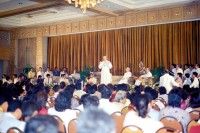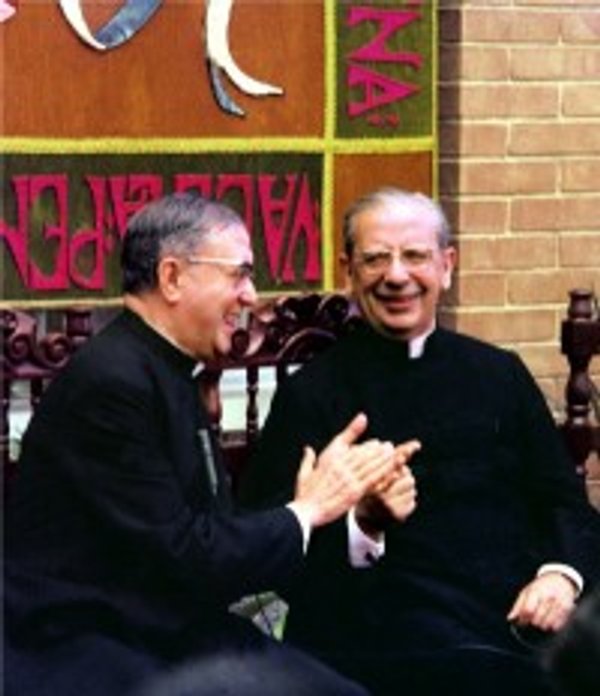LAST July 5, Pope Francis signed the decree recognizing the miracle attributed to the intercession of Alvaro del Portillo. That opened the way to his beatification. A Blessed, or beatified person, is a saint. But not listed as one on the rolls of the Church’s canonized saints. To be a canonized saint a second miracle attributed to the intercession of the Blessed must be recognized by the Vatican.
Earlier on June 28, 2012, in Rome, then Pope Benedict XVI signed a decree that recognizes the “heroic virtues” of Alvaro del Portillo, declaring that he be called “Venerable.”
Previous to these events, tribunals did deep investigation and interviews of reliable witnesses. The findings of these tribunals, allowed the cause of the canonization of the late Prelate of Opus Dei to be opened.
Msgr. Flavio Capucci, Postulator for Bishop Alvaro del Portillo’s Cause of Canonization, has described the miracle attributed to his intercession:
“The miracle is the recovery of a Chilean baby, with brain damage and other pathologies who, after suffering a cardiac arrest for over half an hour and a massive hemorrhage, not only continued living, but experienced an improvement in his general state, eventually reaching the point of being able to lead a normal life like any other child. The events took place on 2 August 2003. His parents prayed with great faith through the intercession of Bishop Alvaro del Portillo and, when the doctors thought the baby had died, without any additional treatment and in a totally unexpected way, the heart of the baby started beating again, until it reached 130 beats per minute. The most surprising thing about this case is that, despite the gravity of clinical diagnostic, the child today, ten years later, leads an absolutely normal life.” (Source: Q&A with Msgr. Capucci published in various magazines and newspapers)
In the Q&A, Msgr. Capucci also answered the question: “Why is Bishop Alvaro de Portillo a candidate for beatification? What has he done?”
Msgr. Capucci’s reply: “His life was a constant “yes” to God’s demands.
Bishop del Portillo gave himself heroically to the service of the Church and of souls, faithfully following the example of Saint Josemaria Escriva. He brought many people closer to God.
“To open a cause of canonization, the decisive factor is a well-established reputation for holiness, which is both spontaneous and widespread among a significant portion of the People of God. Bishop del Portillo’s cause was initiated because, right from the day of his death, there were very clear signs of this reputation. Many people all over the world were convinced that he was a saintly man and invoked his intercession with a view to obtaining favors from Heaven. The role of the “cause” is to verify that this reputation has a real basis. The decree regarding heroic virtues promulgated by the Congregation for the Causes of the Saints on 28 June 2012 tells us that the Church has indeed reached a positive judgment about his holiness of life.
“In addition to his personal struggle for holiness, one should also consider the decisive push he gave to the creation of institutions for the good of others, such as for example the Monkole Hospital in Kinshasa (Congo), the Niger Foundation hospital in Enugu (Nigeria), the Campus Bio-Medico University in Rome, the Pontifical University of the Holy Cross and International Ecclesiastical College Sedes Sapientiae, also in Rome, where thousands of seminarians and priests receive careful doctrinal and spiritual formation.”
I must add here that Venerable Bishop del Portillo inspired the establishment of several social development projects in the Philippines. The two most visible ones are in Cebu and Metro Manila.

San Jose, Cebu’s Center for Industrial Technology and Enterprise, is the result of his suggestion to Opus Dei members and cooperators, when he visited Cebu in 1987, that they should set up a project to help people who had few or no financial resources.
Back in Rome, in Opus Dei, he asked two specialists in Italian organizations of international cooperation to study the possibility of helping to start a school in Cebu. Three years later, in 1990, the Center for Industrial Technology and Enterprise (CITE) started. It offers technical and administrative training, as well as formation in values and basic services, to young people and families with financial and social difficulties. Those trained by CITE have had a positive influence in their communities in the Visayas and in Mindanao. CITE offers courses in mechanics, electricity and electronics. More than 3,000 people have graduated and it has obtained international quality certificates. The Philippine government recognizes it as one of the best technical schools here. Go to https://cite.edu.ph.
Metro Manila-based Developmental Advocacy for Women Volunteerism (DAWV) is an educational program that began in 1989. It aims to develop the social conscience of those with financial resources and encourage them to help people in need not just with material means but also with education and advice. It works with volunteers (housewives, doctors, business women, social leaders, students) who receive formation on topics such as the roots of poverty, the principles of social justice and the Social Teaching of the Church, and organize courses, such as the promotion of volunteer work and the program for rehabilitation. Through a network of 1,500 young volunteers, the DAWV foundation helps about 50,000 people in different areas of Metro Manila. (Source: DAWV)
Then Pope John Paul II said of him: “He was an example of fortitude, trust in divine providence and fidelity to the See of Peter.”
Then future pope Cardinal Joseph Ratzinger, Prefect of the Congregation for the Doctrine of Faith, said of him: “I remember the humility and availability in any circumstance that characterized the work of Msgr. del Portillo as Consultor of the Congregation for the Doctrine of Faith. With his competence and experience, he offered an exceptional contribution, as I was personally able to verify.”
Sister Teresa Margarita, Discalced Carmelite said in a letter: “I met him on a retreat he gave for young people at the School of the Carmelites of Charity in Vigo in 1945. He impressed me right away with his distinguished demeanor, his recollected spirit and deep humility, and also his simplicity. He was both kind and welcoming, and took care of us with evident goodness.”
Bishop Ramon Búa, Bishop of Calahorra y La Cazada-Logroño, said: “In him I found a brother and bishop of exceptional human and ecclesial standing.”
I first met him in Rome in 1982. I was with my wife. My comprehension of spoken Spanish is inadequate. But my wife and I felt deeply that we understood what he was telling us: To continue being devoted to the welfare of each other and our children, but also to expand our willingness to serve others and to be faithful to the teachings of the founder of Opus Dei. We could only attribute our ability to understand what he said to us to the Holy Spirit. His presence made me feel the warmth that enveloped the two disciples at Emmaus as they talked with the Man they did not yet know was our Lord Jesus.
The second time was in Hong Kong five years later. My wife, my son Immanel and I had the honor—and great joy—of serving Don Alvaro del Portillo dinner. He was with Opus Dei priests and members and the present prelate of Opus Dei, Bishop Javier Echevarria.
My comprehension of spoken Spanish was still inadequate but again I had the power to understand everything he said to me, something that doesn’t happen with someone else speaking to me in Spanish.
I still feel the warmth of his fatherly hug. And am sure that it was another Christ, Our Lord himself, who was with me.
